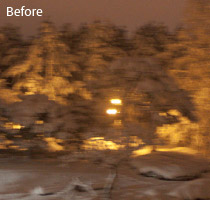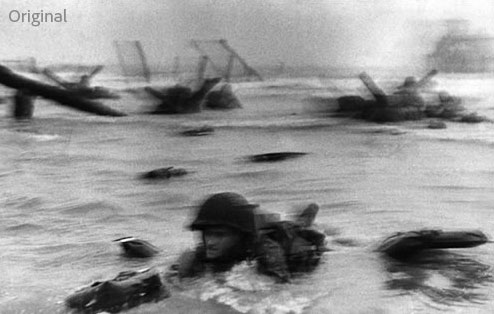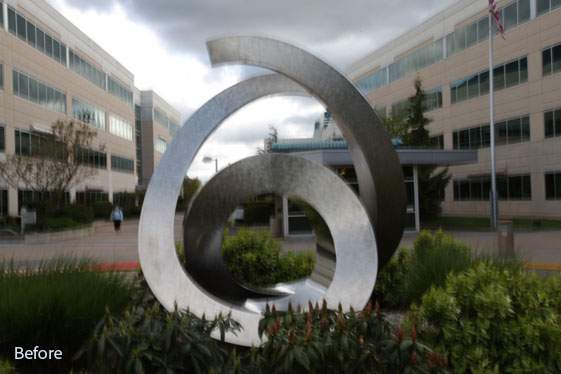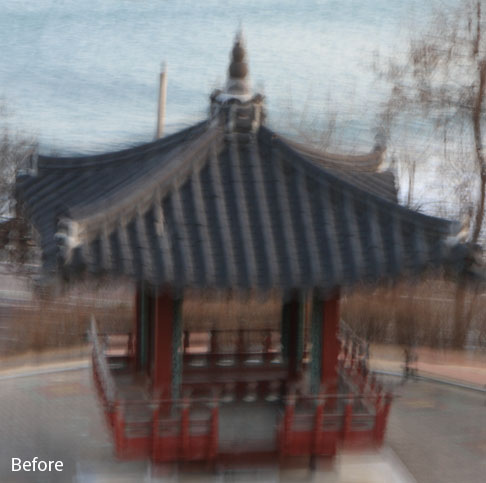[UPDATE (April 2013) – Confirmed: Image Deblurring is coming soon in Photoshop!]
Here is the latest news on Photoshop Image Deblurring: In response to some of your questions here at ProDesignTools, we contacted Adobe and requested they help “bring into focus” the new Deblur feature that could be in a future Photoshop. We got in touch with Dr. Jue Wang, Adobe senior research scientist, and as a direct result his team has provided more examples of the technology using notable photographs. Most of these are well-known from history or come from independent sources, and thus began with natural camera blur.
For those just joining us on the story, here’s a quick review: Earlier this month we ran a feature article on this “sneak peek” of an amazing new capability revealed at Adobe MAX. Several blurry photographs were processed through a new Photoshop plug-in to give before-and-after results that wowed the crowd, even more than the other popular sneak demos at the show. [See the full video in HD]

Why did controversy later arise? For the last brief image of his demonstration, intending to be entertaining and relevant to the audience, Dr. Wang used a photo of Adobe CTO Kevin Lynch that had been synthetically blurred. Creation of synthetic inputs is common practice across the research in this field, but out of simplicity, Dr. Wang did not go into those origins at the time.
The original sharp version was found online, and even though the other images came from real-world blur due to camera shake, this opened the door for some to raise questions about the efficacy of the developing technology. After we contacted them, Adobe added an update to their Photoshop.com blog post explaining why synthetic blurring was used for that example, but some skepticism remained.
So we got in touch with Dr. Wang again and have been working with him over the weekend. In response, his team put together a group of independent photographs that began with natural camera blur and included the results from Photoshop’s Image Deblurring algorithm. Here is what he wrote to us yesterday:
This is still early-stage research and as it develops we will definitely be reaching out to the community for testing examples. But at the moment our researchers are still refining the technologies. In the meantime, we have put some real-world examples on our fun Deblur Famous Photos webpage, and there will be more. On the page you can also find a way to contribute to our research.
We hope you find these as helpful and interesting as we do. Just roll over each photo with your mouse (or tap) for the before and after results. And if you have an image of your own or a good-case historical photo, please see the invitation on how to propose it for deblurring at the end of this article.
Robert Capa’s D-Day Photo
This is perhaps the most famous blurry photograph in American history. It was taken by Robert Capa on June 6, 1944, during World War II. The picture captured an American soldier landing on Omaha Beach on D-Day in Normandy, France. As you can see, the technical quality of the original is challenging – there is an enormous degree of blur, noise, and artifacts. It’s an extreme test of the Photoshop deblurring algorithm, but check out the noteworthy result – particularly in the foreground, and the new detail revealed in the G.I.’s face.

Microsoft’s Sculpture Test
Here is an authentic photograph Microsoft used as a test for their own picture deblurring solution, which involved having hardware gyro sensors built into a special camera and then using the sensor data recorded at the time of image capture to automatically deblur each photo taken on it. As a challenge, the Adobe team fed the same original Microsoft image blurred from camera shake into the Photoshop prototype, which of course did not have the benefit of the recorded data to work backwards from. Yet the Photoshop output compares favorably with Microsoft’s result that had required the special apparatus.

Korean Pagoda
One last example we’ll cover is from the Hwanho Sunrise Park in Pohang, Korea. This photograph was an inspiration to the Korean team that originally created the Photoshop unblur technology, in that the image convolution was so bad that it seemed impossible to save. But the researchers didn’t give up working on their algorithms – and then finally late one night, it worked. Notice in particular the water, the trees, and the bench at the lower right.

More
Of course, the developing algorithm does not always work so well (which the researchers freely admit) – and you can see an example of that, plus more details and estimated blur kernels for all images at the Deblur Famous/Interesting Photos page, where visitor submissions of additional photos are also invited.
[UPDATE (October 2012) – Don’t miss Adobe’s latest news on the Photo Deblurring feature!]
Read more about this sneak peek, or watch the original Photoshop Deblur demo in its entirety, now in full-screen High Definition video… Also catch the cool sneaks for other Adobe products:
- InDesign Liquid Layout
- Three for Premiere Pro & After Effects
- All 11 sneak peeks presented at the show
See the best from Adobe MAX 2011 – including the keynote presentations plus over 160 hours of free tutorials and training sessions from the experts, on a wide range of topics covering all major Adobe applications.
Check out more Adobe Photoshop (CS5) magic with advanced demos and techniques for the new Content-Aware Fill feature as well as Puppet Warp.
See Also
— CS6 Grace Period! Buy CS5.5 Now + Get Free Upgrade to CS6 When It Ships
— Adobe: CS6 to Ship “Late in Q2” with Very Compelling New Features
— Sneak Previews of CS6: Dreamweaver, InDesign, Flash Pro, Illustrator & Premiere
— Win New Photoshop CS6 + Lightroom 4 FREE! ($1000 Giveaway)
— What’s the Difference Between Photoshop CS6 vs. CS5 – What’s New in Features?





Yeah, it’s not perfect but still it’s amazing. Is there any chance we can get that plugin?
I tried Adobe Labs but doesn’t look like we’re gonna get anything before the official release…
Good questions Pie! Your comment on our first article about Photoshop Deblur seemed to indicate that this new feature wasn’t in the Adobe Photoshop CS6 beta… So whether it will be in CS6 at all when it comes out is very unclear.
It would be great if Adobe made this available on Labs in any event, wouldn’t it? But the researchers indicate it’s not ready for prime time at this stage.
Yeah I know it’s an early stage but who cares!! I just wanna try it and amuse myself :)
Oh geez the Capa D-Day de-blur is bad taste… shall we move the pyramids too, they are a little far apart!
Thanks for your thoughts Michael, and we agree there is no need to change history, especially history as important as that. The WWII photo was chosen solely as a well-known blurred photograph to demonstrate for challenging technical qualities, and not as any indication or commentary on the subject material, artistic merit, or photographer.
However, it is interesting if we can apply new techniques and current technology to learn new things or details about historical photos and artifacts, similar to what archeologists do… Wouldn’t it be amazing if someone could use this capability on a blurry old photograph they found of their great-great-grandparents, to then learn what their faces looked like for the very first time?
Wow that is incredible ! This would be great to have for cell cameras
Indeed it would, Tioga… In fact the #1 camera on Flickr now is actually the iPhone.
It would also be helpful for handheld low light, as illustrated with the nighttime winter scene example at the top.
Thank you for your comment!
I need to know who posted these photos, you only provided blurred pictures but not the fixed ones. Please post them so we could know how that tool actually works, thanks.
Hi, the fixed (unblurred) photos are actually there – just roll-over or click the blurry images with your mouse…
If that doesn’t work for you, then you must be in the 1% of visitors here who have JavaScript turned off – it needs to be on to see the effect.
This is amazing. This is what we were searching for. It will save us. We have this problem on 60 speed. We are losing some important shots because there was no way to deblur the image.
Great article. Tnx.
Lefteris
Thanks Lefteris, and yes you’re right that this could help out for low-speed shots that wind up blurred from long shutter exposure times…
In fact, many of the deblurring examples shown in the authors’ research paper are images that came from low-speed or low-light situations.
As a feature film director, I would find this tool enormously useful. Is there any chance it will be available, even in Beta form, in the next release?
Would it be helpful to Adobe to use testimonials from film professionals to advertise this amazing feature?
Agreed Larry, and one can hope! However in Adobe’s original MAX demo for deblurring, they called it an “early prototype” – and they seem to have been playing down the “readiness” of the feature since…
So really, it’s anyone’s guess and we won’t know until CS6 is out.
If you want to express your interest in the meantime, just go to Adobe’s Official “Wishlist” where suggestions and feedback are welcomed.
I knew there was a reason to keep some of those blurred photos. Can’t wait to get my hands on the plugin or get in on the beta tests.
Dealing with blurry images makes up a large part of my day. It would be awesome if there was a pre CS6/CS7 version available as a separate plugin
I have the CS6 pre-release and nothing is there unfortunately… Let’s hope for the official version – or at worst CS7!!
I have a recent photo photo taken in Napa Valley where something unusual appeared in the sky. It was taken with a wide angle lens and is a little blurred and I would like to use this tool to clarify the object. How could I submit the raw file for testing?
Yes, you sure can try that Michael – just submit it at the Deblur Famous & Interesting Photos page, where it could even get published.
Thanks for asking and good luck with it!
All I have to say is can’t wait, so awesome!
Any update?
Hi Doug, thanks for asking – no update that we’ve heard of at this time.
I could recreate the ‘deblurring’ done to the photos used in this example myself with the tools currently in cs5. Simply by doing some layering and sharpening. These look nothing near as complicated and sharp as that crowd scene used in the original demonstration by Adobe. The first minute i saw that pic i suspected right away that it was just a clear image that they blurred on purpose. They admitted to doing that with the pic of the guy, but not to that crowd scene, and i’m sure that is what they did. I doubt we will see a true deblur tool that works like that (supposedly) did for a very very long time. It’s not in the photoshop cs6 beta and probably won’t be available in the retail version or as a plugin this year. It’s still wishful thinking imo.
Thanks for your thoughts. You’re right that the Photo Deblurring feature is not in the Photoshop CS6 Beta Release… You can read more from Adobe on why.
Or check out all the differences between Photoshop CS6 vs. CS5.
As for the photographs the Adobe research team used for these public demonstrations (including the historical photos on this page), all but one of them was naturally blurry before the deblur technology was applied.
so there is no deblurr option in photoshop cs6??
as an amateur photographer, and just start editing photo last week, shaking images will definitely haunt me :(
is there any other way to fix shaking images?? thx
No actually William, the unblurring feature didn’t make the features of the Photoshop CS6 final release…
Almost as soon as the MAX sneak peek video went viral on the web, Adobe made efforts to downplay the blur correction technology, with CTO Kevin Lynch calling it “early stage” and PS Senior Product Manager Bryan O’Neil Hughes describing it as “the holy grail… but candidly, a tough nut to crack.”
It’s still impressive stuff and hopefully we’ll see it in a future release like Photoshop CS6.5 or Photoshop CS7, but for now it seems the story got bigger than the technology was ready for in final form.